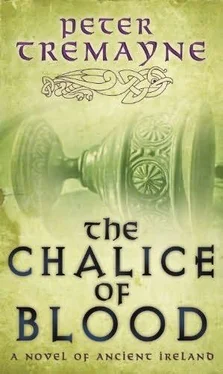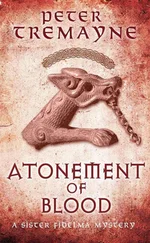Peter Tremayne - Chalice of Blood
Здесь есть возможность читать онлайн «Peter Tremayne - Chalice of Blood» весь текст электронной книги совершенно бесплатно (целиком полную версию без сокращений). В некоторых случаях можно слушать аудио, скачать через торрент в формате fb2 и присутствует краткое содержание. Жанр: Исторический детектив, на английском языке. Описание произведения, (предисловие) а так же отзывы посетителей доступны на портале библиотеки ЛибКат.
- Название:Chalice of Blood
- Автор:
- Жанр:
- Год:неизвестен
- ISBN:нет данных
- Рейтинг книги:5 / 5. Голосов: 1
-
Избранное:Добавить в избранное
- Отзывы:
-
Ваша оценка:
- 100
- 1
- 2
- 3
- 4
- 5
Chalice of Blood: краткое содержание, описание и аннотация
Предлагаем к чтению аннотацию, описание, краткое содержание или предисловие (зависит от того, что написал сам автор книги «Chalice of Blood»). Если вы не нашли необходимую информацию о книге — напишите в комментариях, мы постараемся отыскать её.
Chalice of Blood — читать онлайн бесплатно полную книгу (весь текст) целиком
Ниже представлен текст книги, разбитый по страницам. Система сохранения места последней прочитанной страницы, позволяет с удобством читать онлайн бесплатно книгу «Chalice of Blood», без необходимости каждый раз заново искать на чём Вы остановились. Поставьте закладку, и сможете в любой момент перейти на страницу, на которой закончили чтение.
Интервал:
Закладка:
‘I did not think you were, Abbot Iarnla,’ she replied. ‘As you told me the other day, you have been a member of this community for thirty years and more, and abbot for a large part of that time.’
The abbot nodded absently. ‘I know what you and Eadulf must be thinking. Poor Iarnla. He must be in his dotage. He has given up control of the abbey to this young upstart of the Uí Briuin Sinna. Do not deny it. I know many in this abbey, many among the brethren, are thinking the same thoughts.’
Fidelma smiled at him. ‘You are certainly not in your dotage, Abbot Iarnla. But there is a mystery here that needs to be resolved. Why would you give so much power to this young man. He only joined the abbey a few years ago and is so intolerant and fanatical in his beliefs — beliefs that seem out of step with the reputation of Lios Mór.’
The abbot shrugged expressively. ‘I am not so blind as to be unaware how opinionated and dogmatic Brother Lugna is, nor how he is regarded by the brethren.’
‘Then tell me,’ invited Fidelma. ‘Why give him such power?’
‘I did not. He has taken it and I do not know how to extricate myself from the position I am placed in.’
‘You will have to explain that.’
‘When Brother Lugna joined us, as you know, he had spent some years in Rome. He came ashore at Ard Mór, presumably to journey back north to his homeland in Connachta. The road ran by the fortress of Lady Eithne who offered him hospitality on his journey. Her two sons were then on their pilgrimage to the Holy Land. She invited Brother Lugna to stay awhile, eager to hear what such journeys were like. I think she wanted to be given hope for the safe return of her sons.’
‘Understandably,’ conceded Fidelma.
‘Indeed. She seemed enthralled by Brother Lugna, his stories and his ideas. She even suggested that he join our community. He was, at first, a bright and likeable young man. My old steward had been weakened by a bout of the yellow plague. He had survived its worst ravages but he became ill again and died. That was when Brother Lugna, who was initially held in some respect by the brethren as one who had been all those years in Rome, was nominated to fill the office as steward.’
The abbot paused and licked his lips, which had gone dry. Fidelma rose and poured water from a jug by her bedside. The abbot swallowed it in two gulps.
‘It was only later that we found that Brother Lugna was in fact sympathetic to some of the extreme sects in Rome. He began to change our native ways and methods of doing things. He even destroyed some of the books in our abbey that he did not agree with.’
‘He is not a tolerant person,’ agreed Fidelma. ‘Why didn’t you stand up to him? You could overrule him.’
‘I cannot.’
‘Cannot?’
The old abbot nodded mournfully. ‘He has the full support of Lady Eithne. Everything that Brother Lugna does is deemed to be right by her. In her sons’ absence on pilgrimage, he somehow fulfilled their role for her, and ever since he can do no wrong in her eyes.’
‘How can you stand this? You are the abbot. You have authority.’
‘Do I? You know the law, Fidelma. You know that the chief and the council of the clan on whose land an abbey is built have ultimate say over the fate of the religious community that serves their territory.’
Fidelma knew that in many parts of the country, the lands of the religious communities were still tribal. In several places the abbot was also the chief of the clan or elected in the same manner. The position of abbot and bishop often went through the same family succession. But here, Lady Eithne retained ultimate authority over the community as their chief. It was a curious but not an unusual position.
‘Let me get this right, Abbot Iarnla. Lady Eithne supports Brother Lugna and if you object she threatens the ultimate sanction over the community. Is that it?’
‘The law is the law.’
‘But she can’t strip you of your position as abbot, surely?’
‘No, but she can force the community from these lands or establish a new community under the leadership of Brother Lugna.’
‘Does Abbot Ségdae of Imleach know of this situation?’ Ségdae was also Chief Bishop of Muman. ‘And what of my brother, the King?’
Abbot Iarnla shrugged. ‘The law favours Lady Eithne. I disagree with the way my steward runs the affairs of the community but that is not an argument that carries weight in either the law or in the rules of the religious. They would merely say that in my old age I am fearful of fresh blood and ideas.’
‘And fearful of appealing to my brother and his Chief Bishop?’ Then she paused. ‘Do you suspect these matters have anything to do with Brother Donnchad’s death?’
The abbot’s eyes widened. ‘Heaven forfend! Do you think that when Brother Donnchad returned to the abbey, Brother Lugna thought his position here weakened? That Lady Eithne would reject him in favour of her own son, Brother Donnchad? That Lugna murdered him in order to retain her support?’
‘More terrible things than that have happened,’ Fidelma replied quietly. ‘However, it seems unlikely, for if that is what happened, I would have thought Brother Lugna would have been more subtle about the way he has been conducting himself. Nonetheless, I shall not discount it.’
‘This used to be a place of happiness, even in the latter days of Maolochtair, when the old chieftain had become senile and saw threats lurking in every corner. Today, I walk through the abbey and see these new stone edifices rising but feel it has become a dark, evil and threatening place.’
Fidelma leaned forward and placed a sympathetic hand on the old man’s arm. ‘We will overcome this evil, Abbot Iarnla. Dabit Deus his quoque finem — God will grant an end even to these troubles. I am sure of that. Brother Lugna has tested his strength against mine and found that I am not wanting. I do not think he will be foolish enough to try to block my path in the future. But I will continue to keep a careful watch on him. However, I need to find out more from Lady Eithne. I meanto question her further about Brother Donnchad so tomorrow Eadulf and I, with Gormán, will ride to her fortress and speak to her.’
The abbot rose to his feet and took his lantern.
‘This conversation must remain a secret,’ he said sadly.
‘Don’t worry. Brother Lugna will not hear of it, and nor will Lady Eithne. But I must confide in Eadulf. And at the end of this investigation I shall be duty bound to bring the matter to the attention of my brother and to Abbot Ségdae.’
Abbot Iarnla seemed suddenly very old. ‘I thank you for that, Fidelma. I hate to think such thoughts but it is almost providential that Brother Donnchad’s death provided the means to bring you to Lios Mór so that you can help restore the abbey and its community to happiness once again.’
‘That, indeed, is not a good thought and best forgotten,’ Fidelma replied. ‘By the way, can you confirm my assumption that it was Brother Lugna who brought Glassán to the abbey? Did you know of the builder’s work before he came here?’
‘As far as I was aware, Lady Eithne recommended him. But then, as I have said, she supports Brother Lugna’s choices in all things,’ replied Abbot Iarnla with a frown. ‘Is there something wrong?’
‘Nothing that is relevant as yet,’ Fidelma returned. She rose and went to the door, opened it quietly and peered outside. The passage was still dark and silent. There was no one about. She stood aside and without another word the abbot went out, shielding his lantern before him. For a moment Fidelma was left in darkness and then the moon raced out from behind a cloud, leaving her with light to shut the door and return to her bed.
Читать дальшеИнтервал:
Закладка:
Похожие книги на «Chalice of Blood»
Представляем Вашему вниманию похожие книги на «Chalice of Blood» списком для выбора. Мы отобрали схожую по названию и смыслу литературу в надежде предоставить читателям больше вариантов отыскать новые, интересные, ещё непрочитанные произведения.
Обсуждение, отзывы о книге «Chalice of Blood» и просто собственные мнения читателей. Оставьте ваши комментарии, напишите, что Вы думаете о произведении, его смысле или главных героях. Укажите что конкретно понравилось, а что нет, и почему Вы так считаете.











